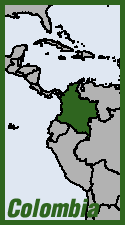 Colombia's National Police announced Jan. 24 the seizure of 1.2 tons of cocaine allegedly belonging to paramilitary group Los Urabeños in the northwestern department of Córdoba. The find came when police searched a truck at a checkpoint that had been established in Montería municipality. The interception was reportedly planned by police intelligence in advance. The two truck occupants who were arrested apparently tried to bribe the officers with $150,000. The agents also confiscated 6,800 gallons of biodiesel and 3,400 gallons of gasoline, worth around $30,000. The cocaine was reportedly en route to the port of Turbo in Urabá region, the Urabeños' heartland in the northern part of Antioquia department, and was intended for export to the US and Europe. The Urabeños are a "neo-paramilitary" group that remained in arms after the ultra-right paramilitary network was officially "demobilized" some 10 years ago. Authorities now consider the Urabeños Colombia's most powerful drug trafficking organization. (Colombia Reports, Jan. 24)
Colombia's National Police announced Jan. 24 the seizure of 1.2 tons of cocaine allegedly belonging to paramilitary group Los Urabeños in the northwestern department of Córdoba. The find came when police searched a truck at a checkpoint that had been established in Montería municipality. The interception was reportedly planned by police intelligence in advance. The two truck occupants who were arrested apparently tried to bribe the officers with $150,000. The agents also confiscated 6,800 gallons of biodiesel and 3,400 gallons of gasoline, worth around $30,000. The cocaine was reportedly en route to the port of Turbo in Urabá region, the Urabeños' heartland in the northern part of Antioquia department, and was intended for export to the US and Europe. The Urabeños are a "neo-paramilitary" group that remained in arms after the ultra-right paramilitary network was officially "demobilized" some 10 years ago. Authorities now consider the Urabeños Colombia's most powerful drug trafficking organization. (Colombia Reports, Jan. 24)
The haul comes just as Los Urabeños are on a something of a public relations push, distributing flyers in Medellín, Atioquia's capital, claiming responsibility for a 26% drop in homicides last year in the habitually violence-torn city. Refering to themselves by their formal name, the Urabeños said: "Despite what the authorities say, this huge decrease is due to the efforts that the Gaitanista Self Defense Forces of Colombia have made with other social actors of the armed conflict that are present in the city." The leaflet seems to confirm media reports that the Urabeños have forged a peace pact with their longtime local rivals, the Oficina de Envigado, said to be survival of the old Medellín Cartel.
Official statistics indicate that homicides in Medellín dropped by some 25% for a second year running in 2013, with a total of 920 slain in the city. The administration of Mayor Anibal Gaviria boasted in a press release, "these historical figures of 2013 are the result of joint efforts of the mayor of Medellin with security and justice agencies and the effective collaboration of citizens."
But Diego Herrera, president of the Popular Capacitation Institute (IPC), a Medellín-based research group, told Colombia Reports website that "the reduction in homicides has almost nothing to do with the government's policies, and doesn't tell the whole story anyway. If you look at the city's history, what you will see are brief periods of calm that coincide with pacts made between the city's crime bosses." (Colombia Reports, Jan. 10)
Cross-post to High Times







Recent comments
4 weeks 1 day ago
4 weeks 2 days ago
7 weeks 2 days ago
8 weeks 2 days ago
12 weeks 2 days ago
16 weeks 21 hours ago
20 weeks 1 day ago
20 weeks 6 days ago
30 weeks 6 days ago
34 weeks 6 days ago